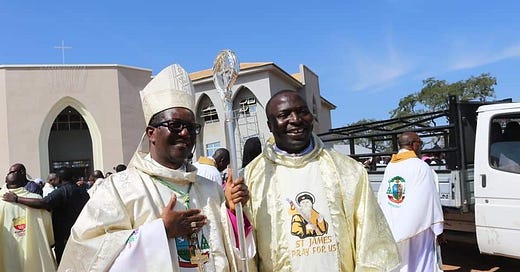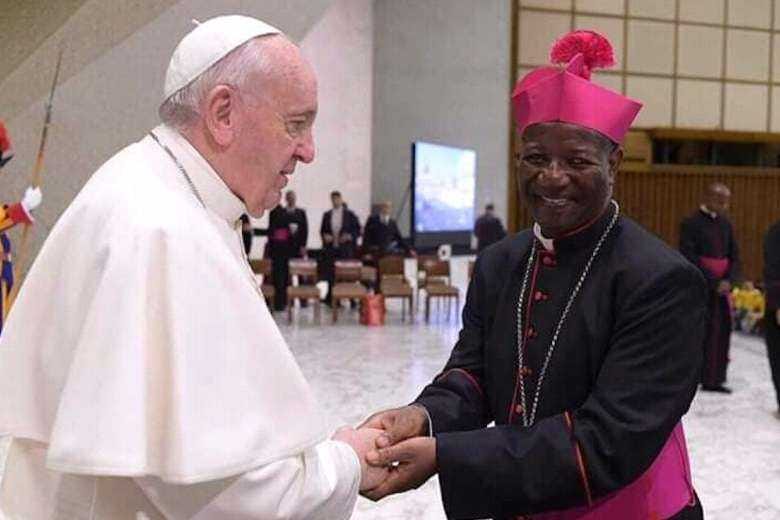
'Our joy is stolen' - Martyred priest's bishop calls for change in Nigeria
A Pillar interview
Six priests from the Diocese of Kafanchan, Nigeria, have been kidnapped in 2022. One of them, Fr. John Mark Cheitnum, was killed by his captors in July.
The Kanfanchan diocese, in the southern part of Nigeria’s Kaduna state, is an epicenter of violence against terrorism against Christians by Islamist militants and Fulani herders. Farms are burned, homes are destroyed, families are left homeless.
Bishop Julius Yakubu Kundi was appointed in 2019 to lead the suffering Kanfanchan diocese. In an exclusive interview, he talked with The Pillar about the violence, self-defense, and whether Nigeria can return to a sense of peace.
This interview has been edited for length and clarity.
Bishop Kundi, violence against Christians is endemic in the southern part of Nigeria’s Kaduna state – which is where you live. Is Kaduna a safe place?
Thank you sincerely for this special offer of the opportunity to express the fears, uncertainties and deep concerns of my people and my Church in this medium.
The situation of insecurity that has befallen us in recent years here in Kaduna state is no longer something new. One could read it everywhere in the media.
But it is important that we keep repeating it at any given opportunity, like this one, because we are really disturbed by the ugly situation and we want the world to know more about our story -- as we tell it ourselves - so that we can be helped.
We are facing a situation that could best be described as a state of near-anarchy.
Our situation leaves vulnerable people, especially women and children and those without any form of protection, to the mercy of God. For more than 5 years now, we have witnessed a deliberate and calculated attempt at wiping out and displacing major indigenous ethnic groups in the northern part of Nigeria. Thousands of our innocent people, in several states but especially in southern Kaduna, are being massacred without any provocation by the well-known Fulani terrorists, under the watch of a democratically elected government, sworn in to protect the lives of all citizens.
An honest assessment of the security situation in Kaduna, therefore, is that life for us has suddenly become short, brutish, and difficult. Our joy is stolen; our esteem wounded.
Bishop, six of your priests have been kidnapped in 2022.
Sadly, too, Fr. John Mark Cheitnum was killed last month.
What are the extent of these attacks? Do they target specifically the Church, or other institutions as well?
What we see and experience here is an evil onslaught unleashed upon the Church.
I am not saying that because my priests have been kidnapped or killed, but we all know that evil has been perpetuated to us the Body of Christ, where we see ourselves burying our parishioners constantly in hundreds – it is a horrifying situation that has left us devastated and feeling forsaken.
Of course, this violence has negatively affected our whole wellbeing both physically, psychologically, socially and economically. Many families are still hurting, some are left feeling despondent and many have lost not just our dear ones but their sources of livelihood.
This in turn has affected the Church pastorally, and compounded the feeling of being unsafe.
Beyond Kaduna, there have been battles between bandits and the military in Abuja, Nigeria’s capital. There were two attacks on the president’s convoy; terrorists have threatened to abduct both Nigeria’s president and Kaduna’s governor?
Is Nigeria a failed state? Can next year’s presidential election make a difference?
Our stories here in Nigeria sometimes sound like comedy. Perhaps you heard that the president didn’t know that there was a threat to kidnap him; a governor from another state had to visit and alert him about it.
Seriously? He didn’t know! There you go!
Taking this seriously tells one that no one is safe in Nigeria as the government of the day cannot even protect itself – to say nothing of protecting the rest of us the masses.
Perhaps you have heard again that the same government has come out to say it’s overwhelmed with the situation of insecurity in the land and everyone should go and protect himself. What does that portend to you?
We are faced with a situation of near total breakdown of law and order, which suggests the absence of leadership. As you know, in sane places, this would be a situation that calls for impeachment of a president or the declaration of state of emergency in the country. But here is Africa, leaders do not lie or fail.
Any concerned citizen that calls for the resignation or impeachment of a president in Nigeria is tagged as an enemy of state, or even hunted and blackmailed.
While speaking at a parish recently, you told your people that politicians have 'betrayed people's trust.'
What is the way out? What is the Church’s message to voters in Nigeria?
Time and again we in southern Kaduna go through this betrayal coming from our political elite for lack of adequate representation. These are our sons and daughters, who know our story and struggle, but hardly do they deliver the services they are elected to give.
So I feel enough is enough.
The people can change the situation by becoming more politically aware of their rights, and the category of persons they vote into power.
This knowledge empowers them to demand for services from the people they elected, and also how to punish them if they do not serve the people well.
As one of those passionate about the emancipation of the people of Southern Kaduna, I have called on all our people to "speak" to their votes with all seriousness before casting them. By this I mean to pray and express a wish over the vote so that their exercise will not be in futility like before.
Bishop, your predecessor - the late Bishop Joseph Danlami Bagobiri - often encouraged Christians to defend themselves from attacks in the diocese.
Given the seemingly helpless situation in which Christians have found themselves, is it right for them to defend themselves?
Defending oneself from an aggressor has always been known and accepted as an action that is legitimate and as ordained by natural law. Again, it is also a principle upheld by the Roman Catholic Church in its moral teachings.
Bishop Joseph Bagobiri was right and was only applying something that is a fundamental right to every human being, and particularly to those whose right to life is threatened. Even though we do not have the means to defend ourselves, we, however, keep educating our people on how to be security-conscious and learn how to stay safe and defend themselves by any lawful means when attacked.
The two-in-one St. Albert's Institute - of which you are proprietor - has distinguished itself in Nigeria by educating both future priests and lay people.
Do you think this institute has a role to play in mitigating religious crises, or building a culture of peace and reconciliation between Muslims and Christians in Nigeria?
The vision of my predecessor, the late Bishop Joseph Bagobiri, to establish St. Albert’s Institute remains one of the huge blessings for my people in southern Kaduna and the entire country.
The institute is not just for training future priests but is open to all lay people, both young and old to take the advantage to study. The mission and objective of establishing the institute is very clear to us as a diocese.
We want the institute to be a center for integration, where people of different ethnic locations, religious affiliations and backgrounds can come together to know each other and to learn how to live and work together.
This is what the country, Nigeria, which is sharply divided into ethnic and religious lines need now more than anything — A center where people, especially the young, can get together and be guided towards reconciliation, tolerance and acceptance of one another.
St. Albert’s Institute is one of such in Nigeria, for we see as a Church to contribute towards harnessing diversity in the country which experts have identified as our strength.
What role do you think local and international media can play in ending religiously-motivated violence in Nigeria?
Importantly, we need the media both at home and abroad to help us tell our story. We want the world to know the true story of how our people are being slaughtered, marginalized and impoverished. That the Fulani terrorists keep overrunning our sleepy and peaceful communities in the night and leaving behind them trail of massacre and destruction of properties.
The world must know that genocide is taking place in southern Kaduna, and life has become for us very short and difficult.
We also wish to invite the media to come and see things for themselves and give their own honest assessment of the situation to the world so that the story will not be one sided.
Do you think local and international responses are required towards helping victims of religiously-motivated violence across the country.
In what specific and practical ways can the international community assist these victims?
Certainly, we need an international response to help us cope with the victims directly affected by the pogrom against the persecuted Christians and other innocent victims of the ongoing terrorism in Nigeria. Our land is drenched with so much innocent blood. We need help, wherever it may come from to stop it.
We need help to support individuals displaced from their habitats to return and rebuild. We need to help those who have lost their farmlands to feed their families and return back to their farms.
We need to build more institutions where we can help reconcile the hurting victims of this sad situation and build more trust with our neighbors.
We also call for prayers, for God to take us out of this mess which the politicians have put us into due to their greed, for we have come to the understanding also that the security situation with us has been politicized.
What strategy is the Church in Nigeria adopting to stem the tide of Christian persecution?
The position of the Catholic Bishops’ Conference of Nigeria is very clear. In our different communiques and pastoral letters, we have come out forcefully to condemn the wanton killings in the country and particularly of our Christian brethren. As a body we have never hesitated to speak truth to power no matter what it may cost.
We have openly accused the government as responsible for this menace and should take the challenge to halt it. We have even advocated that the president of our country who has evidently demonstrated how helpless and overwhelmed he is to keep the country together and safe to resign.
We also continue to preach peace to all peace loving citizens of this country and keep strengthening our parishioners to remain strong and shun any attempt to get involved in anything evil and contrary to the Gospel values.













❤️🙏